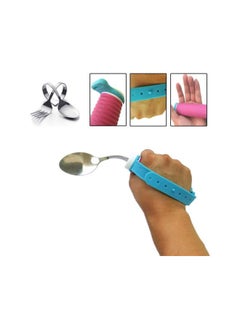Free & Easy Returns
Best Deals




Picking up silverware, a fork, or a spoon, and lifting food to your mouth is natural for healthy people without thinking of every motion required to eat. Disabilities can interfere with daily living activities such as eating. Physical limitations can make eating more difficult and extremely frustrating. Using our special silverware can help. People of all ages who need support to feed themselves independently can benefit from the use of handicapped accessories for eating. Children with a disability as a result of neuromuscular issues, neurological challenges, and developmental disabilities that impact the use of their hands benefit both psychologically and physically from learning to eat with assistive tableware. Adults living with neurological diseases such as Parkinson’s disease, MS, or ALS, or those in rehabilitation from strokes, spinal cord injuries, rheumatoid arthritis, or living with congenital conditions including cerebral palsy may eat with a minimum of help by using our assistive utensils.

